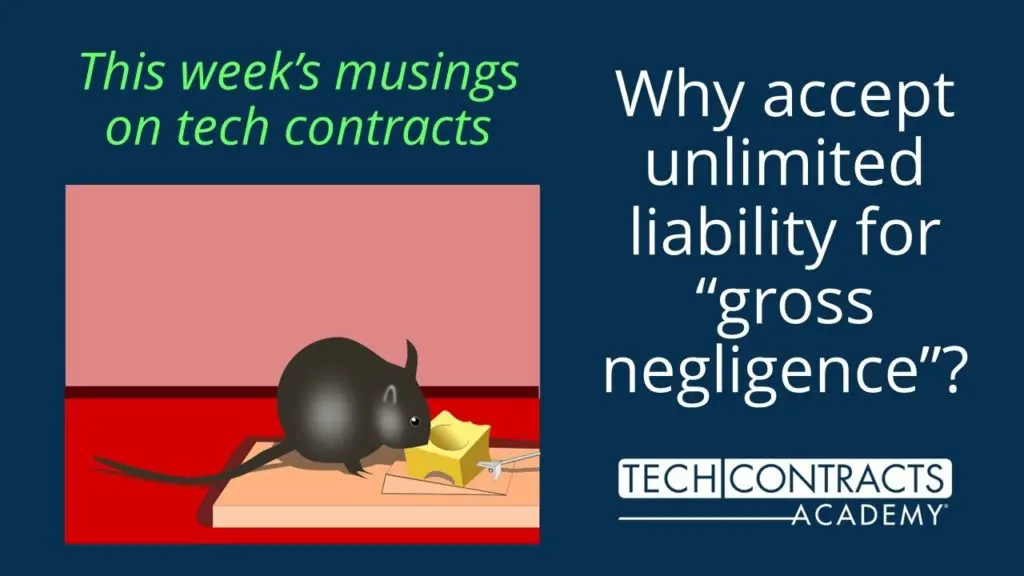This week’s musings on tech contracts
Many limits of liability (LoLs) include an exception for truly terrible conduct:
| Section __ [the LoL] does not apply to … losses caused gross negligence or willful misconduct.
The second part of that sentence doesn’t trouble me, since most U.S. jurisdictions won’t apply an LoL to willful misconduct anyway: won’t enforce it. But the first part – unlimited liability for gross negligence – does trigger some anxiety. At least, it does if my side needs the LoL. In most IT contracts, the vendor needs that protection more than the customer, but in a few, those tables turn. Wherever you happen to sit, if you need the LoL, take a hard look at the gross negligence exception.

More claims, more lawsuits
If you accept unlimited liability for gross negligence, many or most claims of breach will include an argument that you were grossly negligent. Maybe you agreed to the exception on the assumption that it won’t ever matter, since you’ll never be that negligent. Surprise! Your conduct probably won’t ever fall to that low level, but with the gross negligence exception, you still might have to litigate about it. That’s expensive.
In fact, the exception probably increases your odds of being sued in the first place. Some suits won’t seem worth pursuing in the face of a typical LoL. But those suits get more interesting to plaintiff’s counsel with unlimited liability for gross negligence.
What does “gross negligence” mean anyway?
I’m not sure what “gross negligence” means. Yes, I can look it up, but the answer depends on the jurisdiction, and the definitions aren’t precise. The term invokes recklessness. Or as Cornell Law School puts it: “Falling between intent to do wrongful harm and ordinary negligence, gross negligence is defined as willful, wanton, and reckless conduct affecting the life or property or another.” Thank you, Cornell. Now, instead of one word I don’t really understand, “gross,” I’ve got three: “willful,” “wanton,” and “reckless.”
Of course, case law research could add clarity. And of course, we’re used to contract terms with slippery meanings (“negligence” itself, “material,” etc.). Or we should be. Still, let’s not kid ourselves that we’ve added a simple exception to the LoL.
Rationale and public policy
Does the other party need a gross negligence exception? Well, plenty of IT contracts get signed without one: with a standard LoL. So it doesn’t seem an absolute requirement for decency and propriety.
Some argue that gross negligence involves such terrible conduct that liability must have no limit. But there are vanishingly few “musts” in contracts, IMHO. And if the conduct in question really is so terrible, the courts probably won’t enforce the LoL anyway, as a matter of public policy. In fact, many jurisdictions use “gross negligence” itself to describe the conduct an LoL can’t protect (along with “willful misconduct,” noted above).
In those jurisdictions, what’s the impact of adding the gross negligence exception? If you’re sure your courts won’t limit liability for gross negligence – at all – then adding the exception does you no harm. But if you’re not sure … You’ve gone from underlying laws that might require unlimited liability for gross negligence to contract terms that certainly do.
Maybe you’re worried that, if you don’t exclude gross negligence, courts will throw out the whole LoL. Before accepting unlimited liability for that reason, consider a little research. Can you confirm that outcome? And ask whether you can avoid that dire consequence through a smaller measure – like starting your LoL with, “Except to the extent forbidden by applicable law …”
Notes:
- We cover this and other LoL issues in The Tech Contracts Master Class™ (course 3, Key Liability Terms).
- For more on the gross negligence exception, see Subchapter II.M.4 (“Exceptions: Unlimited Liability”) of The Tech Contracts Handbook, by David W. Tollen – and for the LoL in general, see Chapter II.M (“Limit of Liability”).
- This article is not legal advice. Legal situations vary, so you should consult a qualified attorney. See our Terms of Use, Section A.
© 2024 by Tech Contracts Academy, LLC. All rights reserved.
Thank you to Pixabay.com for great, free stock photos!
